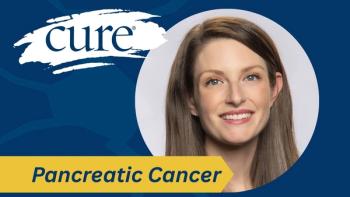
- CURE® Gastrointestinal Cancers 2021 Special Issue
Gutting Out Treatments For Cancer
Sometimes the only way to get over something is through, and cancer is no different. A survivor gives his perspective on gutting out treatment for cancer.
Years ago, I remember gutting out eight weeks of Navy bootcamp. Being the summer, most days in San Diego were in the nineties or higher. Those weeks seemed like years. The days crawled by. Minutes seemed like hours. Each day, up before dawn we cleaned our barracks from the overhead to the deck, stem to stern, scrubbing out hidden crevices with a toothbrush, making our racks the Navy-way, only to flunk our barracks inspection once again. Beyond the demeaning slurs and getting shoved into the lockers, depending on how the inspectors felt that morning, the consequences ranged from push-up and sit-ups to far worse. Soon, we became dull to being screamed at with expletives non-stop. I think you get the idea.
So, I suppose gutting out cancer treatments is much like pushing through that time at bootcamp. It feels like our treatments will never stop. Our days are stacked with appointments, first with our oncologist and then with some specialist to deal with and yet another complication from our treatments. In between, we are on the phone to schedule or reschedule our appointments for next week with seemly daily trips to our pharmacy to pick up meds with names we cannot pronounce.
Too awake to sleep, we spend hours watching beyond asinine reality TV shows. Anything to keep our minds off all that is being done to us. Instead of lying in bed waiting for our pain meds to kick-in, we hope for a day when sleep will come as easily as it once did. Well-meaning friends and family wear worry on their faces too afraid to think about the obvious question of whether we will make it. Not only does this overwhelm us, but it overwhelms our caregivers who are putting everything they have and more into keeping us alive. It’s craziness.
So, what can we do to get through this?
Take it a day at a time
When facing cancer, it is all too easy to let everything, none of which we can control one bit, overwhelm us. Today’s problems are enough for today. Spending endless time worrying about tomorrow’s problems does us no good. We have no control whatsoever over what tomorrow brings. It only leads to despair and worse depression. Live today to its fullest, forget about tomorrow.
Look for allies
For me, it has been those who have gone through cancer who were the biggest help to me. Our friends and family try to help us, but not having been put through the cancer mill themselves, they often struggle to understand what’s happening to us.
How sunny days can be blue. Why we don’t feel like eating our once favorite foods, like pizza or ice cream. Why we don’t feel like talking about anything. Thus, it is often someone who has been through what we’re going through who can guide us. This is but one reason why I decided to go public about my own experiences with facing pancreatic cancer.
Be honest
Be honest with your friends and family, and most importantly, with your doctors too. No one can help us if we are not truthful about how we’re feeling both physically and mentally. Thanks to endless self-help books, many of us have a bent to stay positive even when things are worse than awful. Don’t get me wrong there is nothing wrong with positivity if it’s real.
Faking it though doesn’t help. Thus, if you’re feeling bad say so. If someone is getting on your nerves say so. But beyond saying so, say why. This has been hard for me and continues to be hard even today. It’s one thing to be honest but if we don’t explain why to those who are trying to help us, they can walk away feeling hurt. And worse become unwilling to lend a hand.
Push the bounds
Our doctors mean well but when working 70 or 80 hours per week there is a limit to what they can do. Some cancers respond well to treatment while others don’t. It can be frustrating to be in treatment and have it go sideways. It can be more than frustrating not to know why a particular treatment has been prescribed over another.
Being a life-or-death situation, rather than nod our heads up and down when our doctor says something we don’t understand, we need to learn to not be afraid to ask questions. If necessary, we may need to challenge their non-answers or maybe seek a second opinion. It’s our lives, not our theirs. How can we participate in our treatments if we don’t understand them? Push the bounds.
Gutting out cancer treatments are harder than hard, uphill all the way. But like much of life it’s doable if we’ll take it a day at a time, look for allies, push the bounds, and seek out help if we need to. These are just a few of the things I’ve learned after being put through the pancreatic cancer gauntlet.
Articles in this issue
almost 5 years ago
Cancer Sometimes Does Not See Agealmost 5 years ago
A New Frontier: Identifying Traces of Colorectal Cancer in the Bloodalmost 5 years ago
Overcoming Obstacles to Targeted Therapy in Colon Canceralmost 5 years ago
Genomic Testing Offers New Therapy Options for Hepatobiliary Cancers



